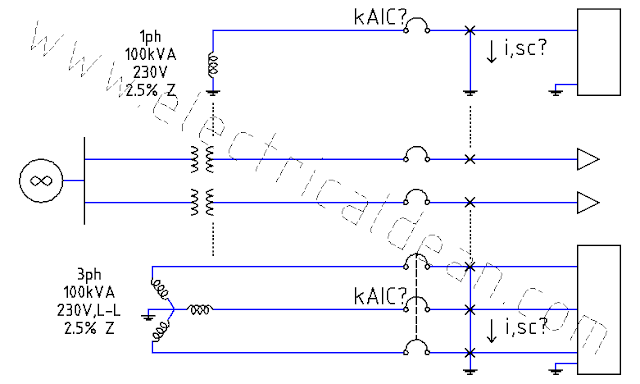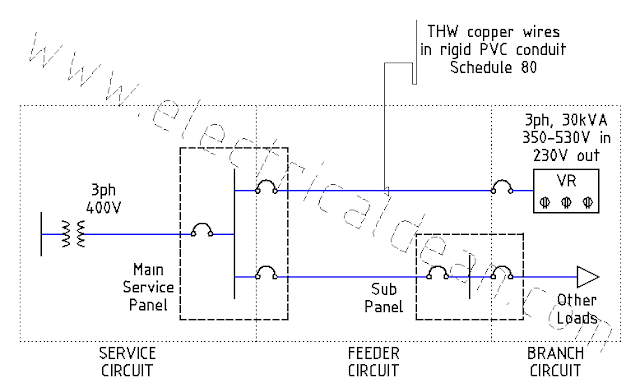Loads - Scenario 5
It is desired to improve the power factor of a 230V, 60 Hz, 3-phase system from 0.7 to 0.92 lagging. A wye-connected capacitor bank with capacitance of 10 microfarad per phase is to be used. What is the kW of the load?
ANALYSIS
1.) Capacitor reactance, 1ph:
1.1.) Scalar:
X,c,1ph = 1 / (2 pi f C)
X,c,1ph = 1 / (2 pi 60 * 10uF)
X,c,1ph = 265.2582 ohms
1.2.) Vector:
X,c,1ph-> = 265.2582 ohms / j
X,c,1ph-> = -j 265.2582 ohms
X,c,1ph-> = 265.2582 ohms < (-90 deg)
2.) Capacitor power, vector:
2.1) Real power
The capacitor is purely a reactive device. Since there is no resistance, no power dissipation happens. Therefore, capacitor real power does not exist.
P,c-> = 0 Watts
2.2.) Reactive power, 3ph:
Q,c,1ph-> = V,c,LN-> (i,c,1ph->)*
Q,c,3ph-> = 3 Q,c,1ph->
Q,c,3ph-> = 3 V,c,LN-> (i,c,1ph->)*
-- Conjugate (i->)* means "to reverse angle sign".
Q,c,3ph-> = 3 V,c,LN-> (V,c,LN-> / X,c,1ph->)*
Q,c,3ph-> = 3 (V,c,LL-> / sqrt(3)) (V,c,LL-> / sqrt(3))* / (X,c,1ph->)*
Q,c,3ph-> = 3 [ (230V < 0 deg)/sqrt(3) ] [ (230V < 0 deg)/sqrt(3) ]* / [ 265.2582 < (-90 deg) ]*
Q,c,3ph-> = 3 [ (230V < 0 deg) / sqrt(3) ]^2 / (265.2582 ohms < 90 deg)
Q,c,3ph-> = 3 [ (230V < 0 deg)^2 / 3 ] / (265.2582 ohms < 90 deg)
Q,c,3ph-> = (230V < 0 deg)^2 / (265.2582 ohms < 90 deg)
Q,c,3ph-> = 199.4283 VAr < (-90 deg)
Q,c,3ph-> = -j 199.4283 VAr
-- Negative means "supplying"
3.) Old system power factor
3.1.) Power factor angle
pf,old = cos(a) = 0.7 lagging
angle a = (+)arccos(0.7) = 45.573 deg
-- Positive angle of power means "lagging".
3.2.) Relationship between real power and apparent power
pf,old = P,old,3ph / S,old,3ph
P,old,3ph = pf,old * S,old,3ph
P,old,3ph = (0.7) S,old,3ph
4.) New system power factor
4.1.) Power factor angle
pf,new = cos(b) = 0.92 lagging
angle b = (+)arccos(0.92) = 23.0739 deg
-- Positive angle of power means "lagging".
4.2.) Relationship between real power and apparent power
pf,new = P,new,3ph / S,new,3ph
P,new,3ph = pf,new * S,new,3ph
P,new,3ph = (0.92) S,new,3ph
5.) Relationship between old power and new power
5.1.) Real power
Real power is not affected when reactive components are added.
P,new,3ph = P,old,3ph
5.2.) Apparent power
Since real power is unchanged, it can be used as basis to establish relationships between old and new apparent power.
(0.92) S,new,3ph = (0.7) S,old,3ph
S,new,3ph = (0.7 / 0.92) S,old,3ph
5.3.) Old power equations
S,old,3ph-> = P,old,3ph + j Q,old,3ph
S,old,3ph-> = S,old,3ph cos(a) + j S,old,3ph sin(a)
5.4.) New power equations
S,new,3ph-> = P,new,3ph + j Q,new,3ph
S,new,3ph-> = S,new,3ph cos(b) + j S,new,3ph sin(b)
5.5.) Adding capacitor reactive power
S,new,3ph-> = S,old,3ph-> + Q,c,3ph->
5.5.1) Expanding the equations
P,new,3ph + j Q,new,3ph = P,old,3ph + j Q,old,3ph + Q,c,3ph->
P,new,3ph - P,old,3ph + j Q,new,3ph - j Q,old,3ph = Q,c,3ph->
0 + j S,new,3ph sin(b) - j S,old,3ph sin(a) = -j 199.4283
(0.7 / 0.92) S,old,3ph sin(23.0739) - S,old,3ph sin(45.573) = -199.4283
S,old,3ph [ (0.7 / 0.92) sin(23.0739) - sin(45.573) ] = -199.4283
5.5.2.) Determining the old apparent power
S,old,3ph (-0.4159) = -199.4283
S,old,3ph = -199.4283 / (-0.4159)
S,old,3ph = 479.5102 VA
5.6.) Determining the real power
P,old,3ph = 0.7 S,old,3ph
P,old,3ph = 0.7 * 479.5102
P,old,3ph = 335.6571 Watts
P,new,3ph = P,old,3ph
P,new,3ph = 335.6571 Watts
P,3ph = 0.3357 kW
6.) Quick Rechecking
S,old,3ph-> = 479.5102 VA < 45.573 deg
S,new,3ph-> = S,old,3ph-> + Q,c,3ph->
S,new,3ph-> = (479.5102 VA < 45.573 deg) + 199.4283 VAr < (-90 deg)
S,new,3ph-> = 335.6571 W + j 342.4388 VAr - j 199.4283 VAr
S,new,3ph-> = 335.6571 W + j 143.0105 VAr
S,new,3ph-> = 364.853 VA < 23.077 deg
-- Positive angle of power means "lagging".
pf,new = cos(23.077 deg) = 0.919979
pf,new = 0.92 lagging
CONCLUSION
The three-phase real power of the load is 0.3357 kiloWatt.





Nice sir... Thank you!
ReplyDeleteVery nice site. Very helpful. I hope someday, that your site could do equation or coded in LaTex for a better math equation presentation.
ReplyDeleteA bug help for electrical practitioner. Thank you for sharing!